It was a war that cost an estimated three million lives, more than 60% of who were infants, women and old men who had no real business at the war fronts. Some were killed in hospitals, markets, schools, refugee camps, while asleep in their homes and wherever it was they were found by a band of soldiers driven by pure hatred, a desire to wipe their mortal enemies off the face of the earth and a determination to do whatever was necessary to make sure as Adekunle Benjamin said- no living thing walks the ground again. They were not just killed because they had excused themselves from what they foresaw to be a failing, unworkable national contraption invented to serve the commercial and economic interest of the British empire. In Asaba where thousands of men and women had openly renounced Biafra and announced their loyalty to the Nigerian nation, they still were forced to die in cold blood by a contingent of the Nigerian military led by a certain Murtala Mohammed.
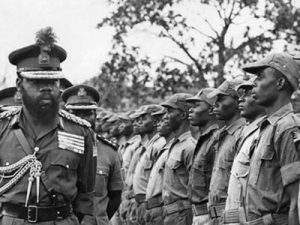
The Nigerian-Biafra war was a war of heroes and villains. The villains were on every side but you would be hard pressed to find a single hero amongst the soldiers who shot children returning from the stream, who raped girls in front of their fathers and threw them into the ocean in riverine communities across the Niger Delta states. How about those who went round homes knocking on doors, dragging out the inmates, shooting them in the heads and mocking them while they bled to death? Shall posterity ever forget characters like Obafemi Awolowo who recommended “starvation as a legitimate instrument of warfare” not minding how his idea- inspired by Satan- would affect children and mothers not directly engaged in the war. Awolowo’s hatred for Biafrans was deeply seated and the war offered him an opportunity to finally exterminate his enemies once and for all. He knew that human lives depended on food to be sustained and by cutting off the food supply chain to the young nation; he convinced himself and his masters that the Igbos would capitulate in a matter of days and would be wiped off in weeks without a single bullet being fired. I can imagine Yakubu Gowon and members of his cabinet applauding what was clearly an idea from the pit of hell to waste millions of lives. If anyone in Gowon’s cabinet opposed Obafemi Awolowo and his ideas, it must have been kept in a secret file no one has had access to till this day. That no one challenged an idea that was capable of killing millions of innocent men and women says an awful lot about the universality of the hatred the men who governed Nigeria had for the their former compatriots.
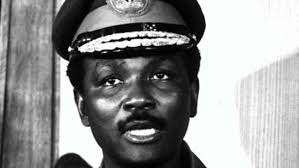
Yakubu Gowon, Obafemi Awolowo, Murtala Mohammed, Mohammed Shuwa (he led the team that killed and raped women farmers as he invaded the Biafra region from the Nsukka axis), Adenkule Benjamin and other officers and men of the Nigerian Army were not the only ones guilty of unprecedented war crimes. In several communities across the North Central region, Biafrans escaping the blood fest in Sokoto, Kano, Kaduna and other neighbouring towns were ambushed, killed and thrown into River Benue or whatever forest that suits the murderers. There was a general consensus- many imagine- amongst several community leaders in northern Nigeria that the Biafrans (be they Igbos or members of the minority tribes in the terriotory) must be eliminated at all costs.
Biafrans, believing in their rights to defend themselves and their land against external aggression soldiered on. They fought like lions and defended their conviction with their blood. Biafrans were vehement in their rejection of Nigeria and all what it represented. Oppression, injustice, retardation and negative growth have no place in region’s culture and values. Sadly, these were the very things the Igbos and their neigbours saw in Nigeria and rose to immediately renounce all of it by electing to seek shelter in a new nation, untainted by lust for power as was witnessed during the 1964 federal elections and plots of ethnic domination. The Biafrans wanted a safe haven where they could pursue their dreams, live as freeborns and enjoy in peace, the fruits of their labour.
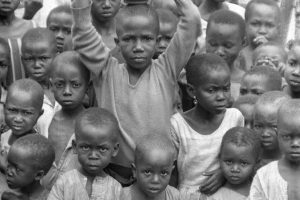
At the end of what till date retains the record of the bloodiest war in Africa, Biafra capitulated and Nigeria claimed victory. Yakubu Gowon however saw things differently. He announced that it was a war “amongst brothers” and hence decreed “no victor, no vanquished.” He announced a post war policy that sought to bring reconciliation amongst all the warring parties, rehabilitate the eastern region which was badly devastated during the war and reconstruct damaged infrastructure.
It is doubtful if those 3Rs were pursued with a sense of purpose and honesty. The territory under the defunct Biafra nation continues to suffer neglect, severe infrastructural deficit and administrative abuses arising from the events of the war. The post-war trauma is still visible in the land till date. It was speculated at the time that the funds earmarked to execute elements of Yakubu Gowon’s policy of 3Rs were embezzled while materials that were procured to ease the infrastructure burden of the people were looted by serving cabinet members who diverted the items to their communities in other regions.
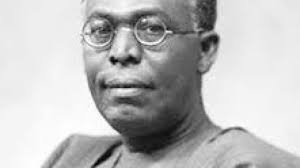
50 years after the Civil War, certain key positions such as army chief of staff (except Azubuike Ihejirika), Inspector General of Police (except Ogbonnaya Onovo), chief of defense staff, defence minister (except Thomas Aguiyi Ironsi Jnr), Director General of the DSS (except Peter Nwaodua), minister of works and several other senior positions in government are regarded as no-go areas for Ndigbo who were the dominant tribe in the Biafra nation. Unlike every other geopolitical zone in the country, the south east zone is the only region with the least number of states, least federal allocations and lowest representations in both chambers of the national assembly. No Igbo man or woman has ever been elected president in Nigeria and it is not for lack of presidential materials. The south east infrastructure network is the worst in the entire country with nearly all federal roads in the region almost in constant state of disrepair. The region has the least federal presence in all of Nigeria and institutional support to enable development are sorely lacking.
Many believe that there is a deliberate policy to keep the region under-developed. Several strategic technological developments put in place by Biafran scientists and innovators during the War were rapidly destroyed by the Nigerian government. Uli airport- built in months was vandalized and decommissioned while the petrochemical refineries, the innovation centre in Enugu were all destroyed by a government that places almost zero value on intellectual creativity. Today, the immense gains made by Biafrans during the Civil War have all been destroyed- deliberately.
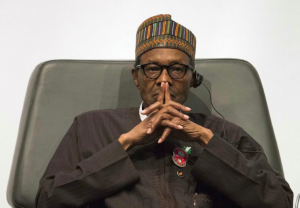
One is convinced that the moment of truth has finally come- fifty years after the War. Is this the Nigeria thousands gave their lives to defend? A nation where close to 20 million youths are unable to find jobs for their hands, where hunger is the order of the day, suffering commonplace and poverty at a world record high? How for example has the Middle Belt states of Benue, Plateau and Kogi benefitted from their participation in the premeditated murder of thousands of commuters, Church goers and those seeking an escape from the horrors in the north east and north west regions? Are the constant attacks by Fulani herdsmen, poor infrastructure and sky high poverty rates just rewards for helping win a war that consumed millions of lives?
Pray, which part of Nigeria today can anyone really point to as a model region? The Boko Haram terrorist group is continuing its relentless assaults on several communities in the north east region, in the north west, if the locals are not confronting murderous bandits, they are fighting the menace of kidnappers and armed robbers. Remember these two regions have the highest incidence of poverty in a nation already renowned for record breaking poverty levels. The regions have the highest population of out-of-school children and even more pathetically, these children face the bleakest of futures when compared with their peers from other parts of the country. How about the south west region? Are they better off? Well, after the north central region, the Yorubas have suffered the most devastating attacks from Fulani herdsmen who rape women, destroy farm crops and pollute sources of drinking water. Lagos today is rated the biggest urban slum in the entire world. The city also ranks tops in the category of cities with the worst air quality.
But nobody should rejoice over the misery of another. It is believed that the regions who fought so hard to defeat the Biafra idea did so on the conviction that Nigeria deserves a chance. They only acted on the basis of the very limited information available to them. Today everyone knows better. The country is structured on multiple layers of injustice and those at the top today may find themselves the most deprived and oppressed when the pendulum swings. No nation thrives on injustice and treachery.

While it is true that things have never been so rosy in Nigeria since the end of the Civil War this day 50 years ago, Nigeria is experiencing its worst crises of nationhood under the reign of Muhammadu Buhari. Buhari-as Shaka Momodu of Thisday newspaper pointed recently – has morphed into the country’s divider in chief. No president has sought to mine immense political advantages from creating divisions, inter-ethnic tensions and religious divisions the way Buhari has. It is hard to describe Buhari’s leadership philosophy. No doubt, he is the most nepotistic leader the country has ever had but how about his preference for northern Muslims when it comes to making senior government appointments? As we speak, the south east region of the country has never had a single representative at the highest level of the nation’s security architecture in the last four years. Almost all the important government positions in petroleum, oil and gas, finance, security, agriculture, works and similar agencies are reserved exclusively for the president’s kinsmen. How can a president be so unmindful of the ethnic sensitivities of the nation he leads?
Justice in the country has gone to the dogs, hunger and poverty have established permanent addresses in Nigeria and things continue to get worse everyday. What differentiates today’s Nigeria from a failed state? More importantly, what hope does Nigeria offer her citizens? Elections are rigged and the chances of an unpopular candidate emerging victorious at the polls have never been higher. Leadership across the nation is a competition in mediocrity and despite claims to the contrary, corruption has reached unprecedented levels as many civil servants, security operatives and those in critical emergency services explore ways of feeding and supporting their families by any means necessary.
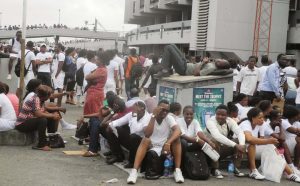
The reality is that the country is facing an uncertain future. No thanks to the betrayal of the populace by a president who came on the mantra of change but has merely governed like a relic from ages past since emerging president in 2015. The sad thing is that fifty years after, the circumstances that led to the emergence of Biafra in 1967 continues to stare us all in the face. Take it or leave it: a civil war is looming in Nigeria. One cannot say who will be fighting who this time but here is what seem likely: the anger of the masses would soon boil over and in time, they would in one hell of an emotional explosion begin to ask questions of those who promised them heaven a few years ago but have only succeeded in destroying everything that births national optimism, destroyed the hopes of the populace and reduced Nigeria to the limits of their pint-sized brains.
Will you be ready?
